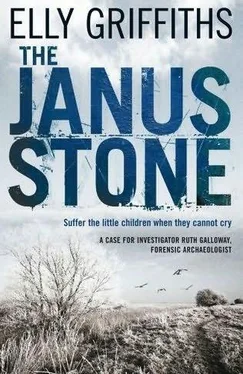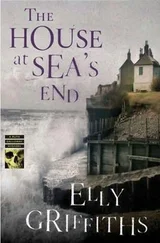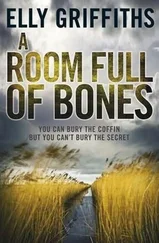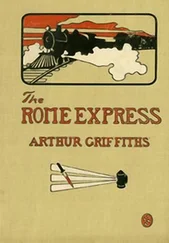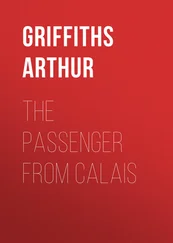‘It is hard,’ she says carefully, ‘especially in cases like this where you’re dealing with the fairly recent past and especially when there’s a child involved.’ She stops, feeling that she has said too much.
But Hennessey is nodding. ‘As a priest I’ve often come across things that are best kept hidden. But the truth has a way of coming to the surface.’
Like the bones under the doorway, thinks Ruth. If Spens hadn’t been so keen to develop the site, if Ted and Trace hadn’t dug in that exact spot, would they have remained hidden for ever? Or would the long-forgotten crime have risen to the surface, crying out for vengeance?
‘Sometimes it’s hard to know what’s true and what isn’t,’ she says.
‘Pontius Pilate would agree with you. “Truth” he said,
“what is that?” And he was a wise man, Pilate. A coward but a wise man.’
Ruth is slightly confused by the way he is talking about Pontius Pilate as if he might, at any moment, walk into Starbucks. ‘DCI Nelson will find the truth,’ she says, with more confidence than she feels, ‘if anyone can.’
‘Ah, DCI Nelson. He’s a fine man, I think. A man with morals.’ Ruth is furious to find herself blushing. ‘He’s a good detective,’ she says.
‘And a good man,’ says Hennessey softly, ‘which may prove more difficult for him.’
Rather reluctantly, Nelson settles for a coke but Trace asks for a pint of bitter.
‘I thought all archaeologists drank cider,’ says Nelson.
Trace pulls a face. ‘Cider’s for wimps.’
I could get to like this girl, thinks Nelson.
‘How long have you been an archaeologist?’ he asks.
‘I left uni five years ago. I did an MA in London and worked in Australia for a bit. I didn’t really want to come back to Norwich but my mum and dad live here and it’s cheaper to live with them. There’s lots of archaeology here too.’
‘Lots of prehistoric stuff,’ says Nelson. He knows this from Ruth.
Trace nods. ‘Bronze Age and Iron Age. And Roman. That’s my favourite period. The Romans.’
‘Did you see Gladiator ? Great film.’
Trace snorts. ‘Films get everything wrong. All that decadent stuff, lying about eating grapes. The Romans brought law and order and infrastructure. We were nothing but a band of disparate warring tribes until they came along.’
Identifying ‘we’ as the British, Nelson says, slightly aggrieved, ‘They were invaders, occupiers, weren’t they?’
‘They were here for four hundred years. That’s more than fifteen generations. And, when they left, we forgot everything they taught us – all the stone building and engineering works, glass-making, pottery. We slipped into the Dark Ages.’
Nelson feels rather proud of this. They may have been here four hundred years, he thinks, but to us they were still foreigners, occupiers, with their fancy, glass-making ways. He does not say this to Trace though.
‘Have you been to the site in Swaffham?’ he asks. ‘Max Grey’s site?’
Trace’s face lights up. ‘Yes. I’ve done quite a bit of work there. He’s great, Max. He really knows his stuff. He did this great tour the other week for the Scouts. Made it all come alive.’
‘Do you get lots of visitors on the site?’
Trace shrugs. ‘A few. It’s become quite well-known since they mentioned it on Time Team. We’ve had some coach parties.’
‘Has Edward Spens paid a visit?’
Trace’s face, so open and animated when talking about the superiority of the Romans, becomes closed again. ‘I think he came once. I wasn’t there though.’
‘Do you know him?’
‘Everyone in Norwich knows him.’
*
‘The Spens family,’ Nelson tells his team, ‘have lived in Norwich for generations. Walter Spens built the house on Woolmarket Road. He was, by all accounts, rather an eccentric. Had a collection of stuffed animals and liked to dress as an African chieftain.’
Clough, scoffing peanuts at the back of the room, coughs and almost chokes. Nelson glares at him.
‘His grandson, Christopher Spens, was headmaster of St Saviours, the public school that used to be on the Waterloo Road. According to his son, Roderick Spens, he was a bit of a tartar, made his children call him sir and forced them to speak in Latin at mealtimes.’
Nelson stops. Sir Roderick had not described his father as a tartar, in fact he had sounded almost admiring, but Nelson had the strong impression of a cold, controlling man. He wonders if he is betraying his own prejudice against public schools, Latin and posh people in general.
Nelson looks at his team. Clough is still spitting out peanut crumbs. Tanya Fuller has her notebook open. Judy Johnson has her eyes fixed on Nelson’s face, frowning slightly.
‘Sir Roderick Spens is in the first stages of senile dementia,’ continues Nelson, ‘so his impressions are rather confused. He remembers his father very clearly but it upsets him to talk about his sister. According to the death certificate Annabelle Spens died of scarlet fever aged six. She died at home and is buried in the churchyard at St Peter and St Paul.’
He looks at the team, wondering if they realise the implications of this. Judy does, obviously, but Clough can sometimes be a bit slow on the uptake. Sure enough, it is Tanya who speaks, ‘Could it be Annabelle who was buried under the door?’
‘I don’t know but I think we have to consider the possibility.’
‘But they buried her.’ This is Clough, sounding almost aggrieved.
‘Yes but it might have been fairly easy, if they had the coffin at home on the night before the funeral, to remove the body and then screw the lid on again.’
‘Why would anyone do that?’
‘I don’t know,’ says Nelson impatiently, ‘but I intend to find out.’
‘Dental records?’ asks Tanya.
‘Yes. You can get on to that, Tanya. The skull we found in the well had a filling in one of the teeth. That’s unusual in such a young child. Should be fairly easy to match. I’m also going to find out if there’s a DNA link between the dead child and Sir Roderick.’
‘What if there aren’t any dental records?’ asks Judy.
‘Then I’ll dig up the grave,’ says Nelson grimly.
All in all, Nelson does not feel in the right frame of mind to attend an experimental production at the Little Theatre that evening. But, then again, when would he ever be in this particular frame of mind? However, he has promised Michelle and even the news that the play has been written by the ridiculous Leo from the medieval evening does not dent his determination to be a good husband.
‘What’s it about?’ he asks, as they edge through the streets looking for a parking space. The Little Theatre is in the new Arts Centre by the docks, a place so trendy that everything is in lower case, making it extremely difficult to read the signs.
Michelle is reading from a flyer which this Leo type has had the nerve to post to her.
‘ The Two-Faced God. Narrated by Janus, the Roman God of beginnings and endings, this is a play about openings, about doorways and fissures and sexual orifices. The action stretches from Roman times, through the industrial and sexual revolutions and ends in a space station set in the distant future.’
‘Jesus wept,’ says Nelson. ‘Sexual orifices?’
‘Harry, you’re such a prude,’ says Michelle, examining her reflection in the passenger mirror. ‘All modern plays are about sex.’
Is he a prude? Nelson considers this accusation as he parks Michelle’s Golf in a space vacated by a moped. It’s true that he seldom finds Cloughie’s jokes funny and that he thinks that Sex and the City is borderline pornographic (and that’s just the shoes). But he’s a man of the world, sex is all very well in its place (he doesn’t allow himself to dwell very long on where that place is), it’s just that he doesn’t want to watch some weedy drama student going on and on about bodily functions. That’s not unreasonable, surely?
Читать дальше
